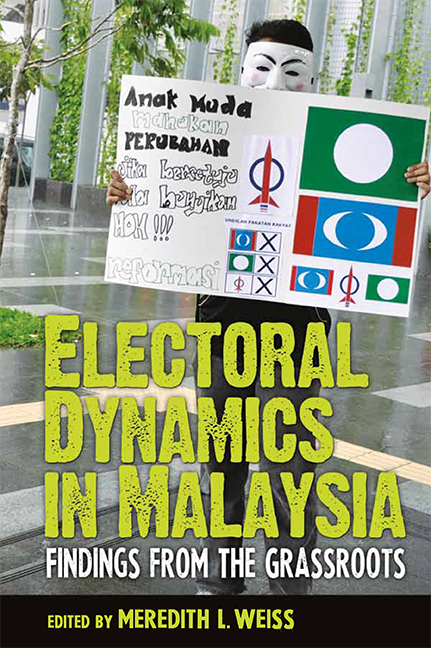Book contents
- Frontmatter
- Contents
- List of Tables
- Foreword
- Acknowledgements
- Glossary & Acronyms
- Chapter 1 Introduction: Patterns and Puzzles in Malaysian Electoral Dynamics
- Chapter 2 Arau, Perlis: The Irresistible Charm of Warlords, Women and Rewards?
- Chapter 3 Padang Serai, Kedah: Between the ‘Personal Touch’ and the Generous Hand
- Chapter 4 Kuala Nerus, Terengganu: New Malay Politics?
- Chapter 5 Balik Pulau, Penang: Home Run for the Home Boys
- Chapter 6 Lumut, Perak: Patronage, Clientelism and the Post-Coup Order
- Chapter 7 Kuantan, Pahang: Revealing the Ordinary
- Chapter 8 Pandan, Selangor: New Electoral Dynamics in Urban Malaysia
- Chapter 9 Kepong and Titiwangsa, Kuala Lumpur: Messages or Money?
- Chapter 10 Rembau, Negeri Sembilan: Personalities and Promises
- Chapter 11 Pulai, Johor: A Tale of Two Coalitions
- Chapter 12 Gelang Patah, Johor: Did Lim Kit Siang Truly Win His Last Gamble?
- Chapter 13 Kota Marudu and Keningau, Sabah: Personality, Patronage and Parochial Politics
- Chapter 14 Tuaran, Sabah: Party Loyalty and Rational Voting
- Chapter 15 Kota Kinabalu, Sabah: BN Loses Its ‘Fixed Deposit’
- Chapter 16 Beaufort, Sabah: Whither Lajim's Popularity?
- Chapter 17 Sibu and Lanang, Sarawak: Defeat of the Bosses
- Contributors
Chapter 4 - Kuala Nerus, Terengganu: New Malay Politics?
Published online by Cambridge University Press: 10 November 2017
- Frontmatter
- Contents
- List of Tables
- Foreword
- Acknowledgements
- Glossary & Acronyms
- Chapter 1 Introduction: Patterns and Puzzles in Malaysian Electoral Dynamics
- Chapter 2 Arau, Perlis: The Irresistible Charm of Warlords, Women and Rewards?
- Chapter 3 Padang Serai, Kedah: Between the ‘Personal Touch’ and the Generous Hand
- Chapter 4 Kuala Nerus, Terengganu: New Malay Politics?
- Chapter 5 Balik Pulau, Penang: Home Run for the Home Boys
- Chapter 6 Lumut, Perak: Patronage, Clientelism and the Post-Coup Order
- Chapter 7 Kuantan, Pahang: Revealing the Ordinary
- Chapter 8 Pandan, Selangor: New Electoral Dynamics in Urban Malaysia
- Chapter 9 Kepong and Titiwangsa, Kuala Lumpur: Messages or Money?
- Chapter 10 Rembau, Negeri Sembilan: Personalities and Promises
- Chapter 11 Pulai, Johor: A Tale of Two Coalitions
- Chapter 12 Gelang Patah, Johor: Did Lim Kit Siang Truly Win His Last Gamble?
- Chapter 13 Kota Marudu and Keningau, Sabah: Personality, Patronage and Parochial Politics
- Chapter 14 Tuaran, Sabah: Party Loyalty and Rational Voting
- Chapter 15 Kota Kinabalu, Sabah: BN Loses Its ‘Fixed Deposit’
- Chapter 16 Beaufort, Sabah: Whither Lajim's Popularity?
- Chapter 17 Sibu and Lanang, Sarawak: Defeat of the Bosses
- Contributors
Summary
Introduction
Kuala Nerus was once a rural area, of which only a small part could be considered semi-urban. Now, however, due to its proximity to the city centre of Kuala Terengganu, Kuala Nerus is predominantly semi-urban. The constituency has undergone massive development and urbanisation, with several key dimensions. First, the federal government has awarded billions of ringgit in development projects since the Barisan Nasional (BN) wrested the state from Parti Islam SeMalaysia (PAS) in the 2004 general election (Elmi Rizal and Tuan Azam 2008). Since 2004, the federal government has built two universities – Universiti Sultan Zainal Abidin (UniSZA) and Universiti Malaysia Terengganu (UMT) – and upgraded a teaching institute in Kuala Nerus, as well as constructing a RM300 million sports complex in Gong Badak.
Second, development has brought an increased population and new demographic patterns. As a result, Kuala Nerus now has a tremendously high percentage of both young and first-time voters: 30 per cent of the total number of voters are under thirty years old and 32.4 per cent are first-time voters. Therefore, the new voters in Kuala Nerus in this election consisted not only of the young generation of local people, but also of new professionals and members of organisations recently established in this area, such as universities and other institutions. At the same time, 10 per cent of the voters in Seberang Takir are military and police personnel, which invariably gives an advantage to the incumbent ruling party.
The fact that the majority of Pakatan Rakyat's victories nationwide were in urban areas makes Kuala Nerus a very interesting constituency to analyse. Close observation of the electoral process in this constituency, including the relative salience of local politics, voters' behaviour and key strategies of the political parties, helps to illustrate the ways in which both the BN and its opponents navigate a new urban developmentalism in a rapidly changing political landscape.
- Type
- Chapter
- Information
- Electoral Dynamics in MalaysiaFindings from the Grassroots, pp. 51 - 64Publisher: ISEAS–Yusof Ishak InstitutePrint publication year: 2013



